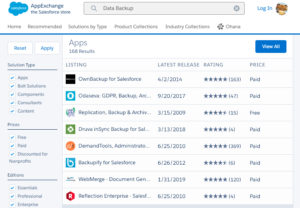One of the many aspects that many don’t consider when managing Salesforce is protecting your data from loss or corruption. A CRM system is only as powerful as the data you hold in it.
Without a backup, what would you do if large amounts of data in your database got corrupted or disappeared?
Is it not Salesforce’s job to backup my data?
Salesforce does not offer an automatic backup service. They only maintain a copy of your data for disaster recovery purposes. Salesforce does, however, provide a data recovery service as a last resort. Although, this is going to set you back $10,000 (USD) per request and you still have to restore the data yourself manually.
Salesforce Data Recovery Service and Cost: Because of the manual intervention, there is a cost. The cost is relative to the amount of manual work and time needed to perform the recovery. The price for this service is a flat rate of $US 10,000 (Ten Thousand US Dollars) for the one Organization that’s being recovered.
Salesforce comes equipped with a ‘Weekly Data Export’ tool that can generate CSV files for all of your data. Although, this can be run a maximum of once a week, has to be manually downloaded within 48 hours of the job completing and needs to be stored and managed locally.
On 31st July 2020, Salesforce retired their Data Recovery solution.
But it would never happen to me?
There are many ways large amounts of data can be corrupted; these can often be slow to spot and cause a lot of damage within that time.
By merely deleting one account record, Salesforce will also delete any associated contacts, opportunities, quotes, contracts, activities, notes, attachments and custom objects. One simple mistake could lead to hundreds of records being deleted without you knowing.
Do you integrate Salesforce with other platforms? Sometimes these systems can have updates or issues that will cause them to update or remove data that they should not be.
When should I backup my data?
Your backups are only as good as the last time they were performed. If you have an issue, would it be good enough to restore the system to the same state as a month ago?
If you are not sure when you should perform a backup, there are three main times that a backup should be considered:
1. Before a feature release
You should never make system changes directly in production. When you are working on new functionality or changes to the platform, these should be completed in a sandbox and deployed once thoroughly tested.
Before you deploy your latest changes, you should perform a data back. Why? The changes you make could cause records to be updated, remove fields or change data types that are not compatible. All resulting in data corruption or loss.
2. Before updating large amounts of data
Although it is straightforward to mass update data in Salesforce using tools such as Data Loader. You should always take caution.
A simple mistake in an upload file such as an error caused by an incorrect vlookup in excel that has aligned the wrong id to each row of data could result in thousands of records being updated with incorrect data.
3. Regular backups
On top of ad-hock backups, you should always keep a regular system backup.
You could be taking backups before features releases and large data updates. However, a user or API connection could be updating or deleting things they should not without you realising.
There is no way for you to know this is going to happen, and before you find out a significant amount of damage could have already been made.
How can I backup my data?
There are many ways that you can backup your data. It is about finding the right solution for you.
For a free and simple solution, you can use the weekly backup tool. Weekly backups are better than nothing and should be considered as a bare minimum. Although it requires manual work, you will be pleased if you ever need it.

The AppExchange has many backup tools including OwnBackup who will backup all of your data & metadata daily. They also provide additional tools such as alerts when there are an unusual amount of changes in your data.
If you don’t have the budget but have a developer, you could create an API connection to a data warehouse, or you can automatically run a Data Loader export each day using batch scripts and scheduled tasks.
How much would it cost you?
When looking at the cost of not having a data backup, there are many things you need to factor in the equation, including:
- How many hours of work productivity will you lose investigating issues and manually recovering data?
- If you lose or have incorrect customer data, could that result in losing a customer due to a lack of trust?
- Could you ever be in a situation where you will need to request a Salesforce data recovery?

